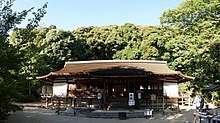Ujigami
An ujigami (氏神) is a guardian god or spirit of a particular place in the Shinto religion of Japan.
The ujigami was prayed to for a number of reasons, including protection from sickness, success in endeavors, and good harvests.[1]
History
The ujigami is thought to have been believed in only since the eighth century.[2]
In its current form, the term ujigami is used to describe several other types of Shinto deities. Originally, the term ujigami referred to a family god.[3] It is believed that, at first, these deities were worshiped at temporary altars.[3] After the Heian period, the Japanese manorial system was established and nobles, warriors and temples had their own private land, the family-based society fell out of use, and belief in ujigami diminished. In turn, the lords of the manors began to pray to the deities to protect their land. These guardian deities were referred to as chinju (鎮守). In the Muromachi period the manorial system declined, and so the guardian deities were enshrined along with the ujigami. An ubusunagami (産土神) is a god of the land of one's birth. Over time, the ubusunagami and chinju came to be seen as the heart of the community, and were eventually referred to as ujigami.[4]
The term ujiko (氏子) is used to describe a person who worships an ujigami.[3]
See also
References
- Hearn, Lafcadio (1913). Japan, an attempt at interpretation. Macmillan.
- Kamstra, J. H. (1967). Encounter or syncretism. The initial growth of Japanese Buddhism.
- Hall, John Whitney (1991). The Cambridge History of Japan: Early modern Japan. Cambridge University Press. ISBN 0-521-22355-5.
- Teeuwen, Mark; Breen, John; Inoue, Nobutaka; Itō, Satoshi (2003). Shinto, a short history. Psychology Press. ISBN 0-415-31179-9.
Further reading
- Hambrick, Charles H. "Tradition and Modernity in the New Religious Movements of Japan." Japanese Journal of Religious Studies 1 (1974): 217-52. JSTOR. Web. 21 Sept. 2010.
- Teeuwen, Mark, John Breen, and Ito Satoshi. "Shinto and the Populace: the Spread of Ritual and Teachings." Shinto, a Short History. New York: New York Taylor & Francis, 2003. 126. NetLibrary. Web. 21 Sept. 2010.
- Hiroshi, Iwai. "Kami in Folk Religion : Ujigami." Encyclopedia of Shinto - Home. Kokugakuin University, 13 Mar. 2005. Web. 21 Sept. 2010. <http://eos.kokugakuin.ac.jp/modules/xwords/entry.php?entryID=231>.
- "Religion and Spiritual Development: Japan." Martial Arts of the World. Santa Barabara: ABC-CLIO, 2001. Credo Reference. Web. 7 October 2010
- Earhart, Bryon H. "A Branch Meeting in Suburban Tokyo: "I" Branch." Gedatsu-Kai and Religion in Contemporary Japan: Returning to the Center. Bloomington Indiana UP, 1989. 122-27. NetLibrary. Web. 21 Sept. 2010.
